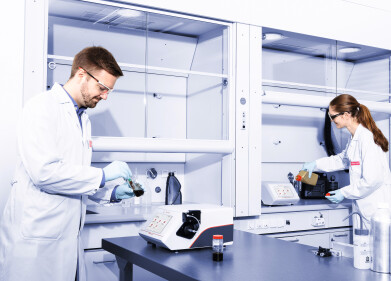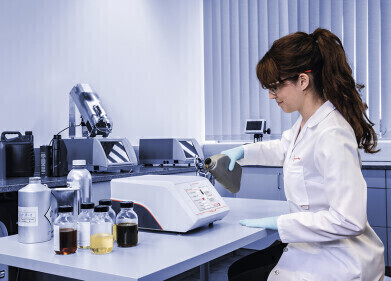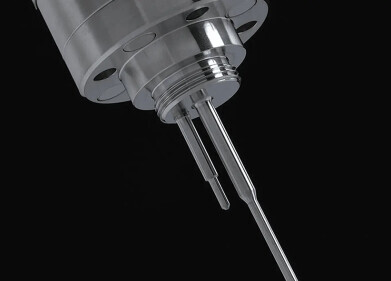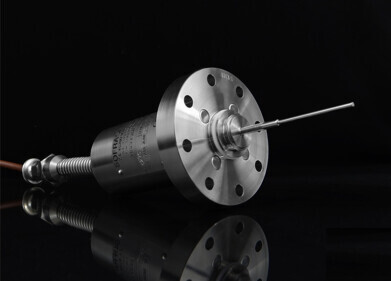Viscometer
The Future of Viscosity Management
Apr 19 2017
Viscosity is one of the most critical measurement performed in a refinery, whether used for determination of product quality or to protect critical process machinery such as pumps and compressors. Historically, refined products have been defined by their viscosity and methods and technologies have been developed over time to give operators more control over their operations. Today, improvements in the measurement and control of viscosity are leading to massive increases in profitability for refiners.
Traditional viscosity applications in a refinery:
- QC Laboratory Viscometer
- On-line Viscosity Monitoring & Control
- On-line Capillary for Product Quality Measurement
The Capillary Tube- ASTM D445 Method
Off-Line viscosity measurement is the traditional approach using the ASTM-D445 method. It is accurate, repeatable. There is however some drawback to using capillary tubes in the lab besides the intensive maintenance. They only give a snapshot of a very specific instant in time; the moment the sample was drawn. Take a snapshot every 8 or 12 hours and you’re going to miss something. It isn’t uncommon for it to take 12 hours or more of processing time to return to on-spec once you’ve lost control. Refiners can burn through $150,000 to $500,000 per occurrence.
On-line Viscosity Monitoring and Control
This approach has been around for a while and is great because it allows refiners to minimise the production of off-spec material during 'product run down', minimise the use of diluents in blending and avoid losing control of the process between lab measurements among other things. ROI can be achieved in days. The trouble here has been in finding a reliable viscometer that can meet the harsh conditions in a refinery.
D7483 Method- The Oscillating Piston- A New Hope
The oscillating piston technique, which exhibits high correlation to primary test methods, uses a magnetically influenced piston to determine viscosity. Two electromagnetic coils drive the piston through a measurement chamber at a fixed force. The time of travel is equated dynamic viscosity and the movement of the piston refreshes the sample and keeps the measurement chamber clean. The technology is robust with no mechanical linkages to bend or break, reliable, being immune to shocks, vibrations, process disruptions and holds a steady, long-term calibration. The rapid data acquisition allows refiners to monitor and correct for process trends or disruptions.
The latest incarnation of the oscillating piston viscometer is the Cambridge Viscosity ViscoPro 2100 by PAC. This instrument incorporates the exceptionally rugged sensor technology with the latest forward compatible electronics to provide not only traditional outputs like Modbus and 4-20mA analog channels for viscosity, temperature and temperature compensated viscosity (TCV), but advanced features like a web UI accessible from a smartphone to allow quick and easy settings changes.
Product Quality Measurement- The ViscoSure and a New Day Dawns
If you want to reproduce the lab results and have a safe number to use for Product Quality, you need to measure Viscosity Index, but you want to avoid a capillary viscometer sunk in two large oil baths. The pumps go every six months. Calibrations are frequent and everything requires draining those oil baths for access.
PAC has taken a different approach with their ViscoSure. It incorporates the proven oscillating piston technology from the ViscoPro 2100 for a stable calibration and long-term dependability. ViscoSure utilizes oil-less Peltier temperature control system so you get measurement at the product specification temperature. It provides three zone temp control to within +/- 0.1°C even with process disruptions. The sample conditioning system (SCS) optimizes instrument performance and protects the analyser from process disruptions. The analyser is robust enough to recover even if asphalt freezes inside and with the high correlation to primary test methods, is fast enough for blending control and accurate enough for final QC measurements.
Conclusion
The ViscoPro 2100 and the ViscoSure are industry-driven innovations designed to address inadequacies in available instrumentation. They solve the problems that have come with the traditional approaches to on-line measurement and product quality measurements by eliminating weak-spots and enhancing the capabilities. The expandable, forward compatible platforms are designed to keep you up running through the next generation.
Author: Patrick Riley, Cambridge Viscosity Sales Director.
Digital Edition
PIN 25.6 Buyers' Guide
January 2025
Buyers' Guide Directory - Product Listings by Category - Suppliers Listings (A-Z) Articles Analytical Instrumentation - ASTM D7042: The Quantum Leap in Viscosity Testing Technology -...
View all digital editions
Events
Jan 20 2025 San Diego, CA, USA
Jan 22 2025 Tokyo, Japan
Jan 25 2025 San Diego, CA, USA
SPE Hydraulic Fracturing Technology Conference and Exhibition
Feb 04 2025 The Woodlands, TX, USA
Feb 05 2025 Guangzhou, China




















